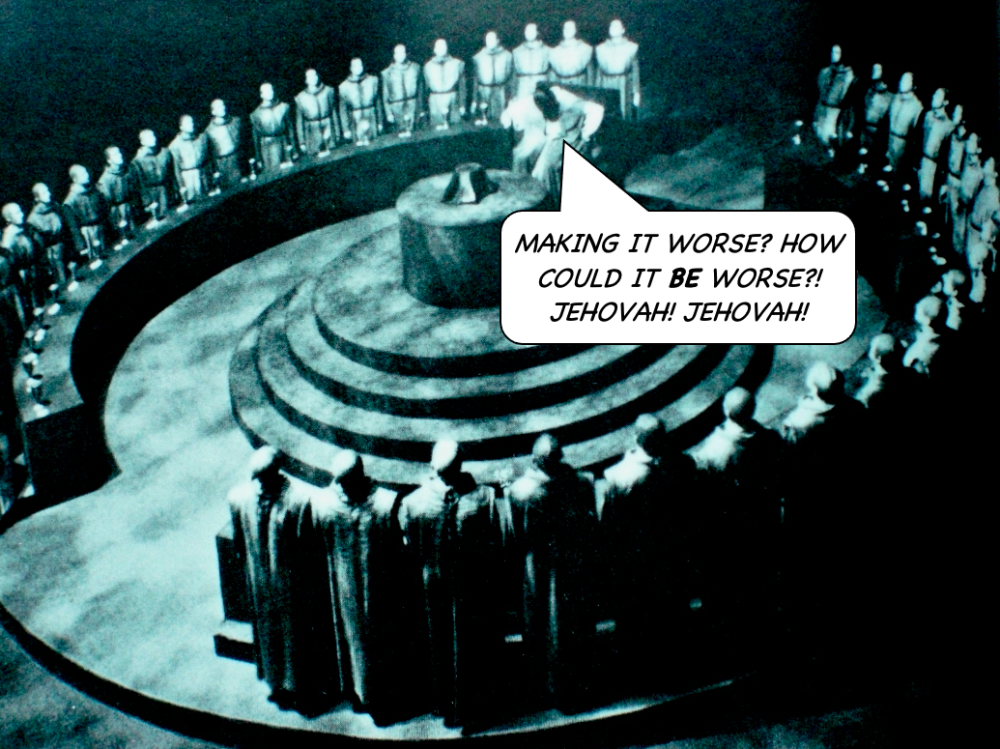Clavam Hominum Senum Pallidorum
|
|
Clavam Hominum Senum Pallidorum (lit., Society of Pale Old Men) was — some say, still is — an unenlightened secret order of gentlemen founded in a remote castle in Romania by the “Orphan Count” Vlad Paripasu[1] in the 13th Century.
The order’s goals were to promote the interests of all those with a fascination for chasing balls, standing around fires, hunting, fishing, carpentry, machinery, gadgets, explosions, racing cars, trains, space, beer-drinking, weak jokes, being knowledgeable about Pink Floyd guitar solos, Monty Python and boobs.
In the dark ages, many men felt the oppressive weight of social expectation: that they must adopt unrealistic gender stereotypes foisted upon them by society’s misconception that males, by biological imperative and on the feeblest pretext, will compulsively showboat, play rugby, start fights, hog resources, enter jousting tournaments and bait bears and, with little more encouragement, wage all-out war for the simple pleasure of dominating any other men who so much as look at them in a funny way.
Returning from a duel one day, it struck Paripasu just how unfair this picture was. Gentlemen, he thought, were just misunderstood. Really, he knew them to be a naturally nurturing, collaborative, caring and homogeneous group, fiercely loyal to each other, and tirelessly protective of their fellow man against the intrusive interests of women, children, animals and nature.
What they all needed was a safe space, sheltered from these hurtful generalisations, where they could meet, help each other out, recite their favourite Fast Show sketches, and generally promote their frail collective interests as a class over the malign, mainly female, forces in society.
Paripasu exhorted his clubsmen to play up to their unjustified stereotype purely as a smokescreen to conceal their real, darker industry. By holding the line against the advancing front of modernity he could not have dreamed how successful his subterfuge would be.
Over time the Senum Pallidorum, as he called it, metamorphosed from a harmless bullshitting club into an occult sect entrenched in the machinery of the deep state, ensuring fellow members were preferred wherever possible, easing them wordlessly into positions of power and influence across the wide run of human endeavour.
Members took an oath of utmost secrecy — on pain of confiscation of their entire collection of Yes albums[2] — which explains why there is so little tangible evidence or acknowledgement of the existence of the society. This also explains the enduring popularity of Yes [Can we check this? — Ed].
It shows just how effective and insidious the group was, and still is, actively manoeuvring in their every activity, public or private, to frustrate aspirations to self-actualisation of anyone who doesn’t play golf or enjoy Jeremy Clarkson’s Sunday Times columns.[3]
To this day, members — who, being honour-bound to deny their participation, use secret handshakes, funny walks and elaborate facial tics to identify each other — are deeply embedded in all branches of government, arts, the academy, trade, commerce and industry. Their influence continues to spread and dominate the national conversation.
In the last thirty years the group’s chilling effect on social justice has become obvious and, vilified by progressive critics who observe that statistics do not lie, and that plainly senum pallidorum loyalists continue to operate unobserved in the deeper shadows of the polity.
Vlad Paripasu is, allegedly, buried in a cemetery in Bistrița, modern-day Transylvania. It is well tended plot, often laid about with wild flowers, coins and amulets from the devoted. Occasionally, a group of two or three will gather to reverently perform the stoning sketch from Life of Brian. His headstone bears only his name, his birth-date — his death is not recorded — and the famous Socratic dialogue:
Socrate: Știai că, ca deghizare, elefanții își vopsesc picioarele în galben și se ascund cu capul în jos în cremă?
Cephalus: Nu am făcut-o, Socrate.
Socrate: Ai văzut vreodată un elefant ascunzându-se cu susul în jos în cremă?
Cephalus: Nu am, Socrate.
Socrate: Asta dovedește ce deghizare bună este.
This translates roughly as:
Socrates: Did you know that as a disguise, elephants paint their feet yellow and hide upside down in custard?
Cephalus: I did not, Socrates.
Socrates: Have you ever seen an elephant hiding upside-down in custard?
Cephalus: I have not, Socrates.
Socrates: That proves what a good disguise it is.
In popular culture
The C.H.S.P. features as an expositionary plot point in Hunter Barkley’s finance fiction potboiler The Atlantis Variation.
See also
References
- ↑ An interesting chap, by all accounts. His parents were killed in a bizarre coracle accident on the black sea, and implausible legend has it that the infant Paripasu was raised by a school of terrapins, earning him the nickname the “Turtle Count”.
- ↑ Even the terrible one in 1988 that only featured some of the original members and wasn’t officially by Yes.
- ↑ Correction: and enjoy Jeremy Clarkson’s Sunday Times columns. It is conjunctive.
